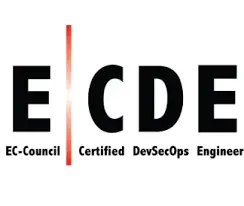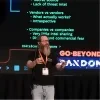Få nye IT kompetencer, bliv certificeret og løft din IT-karriere til nye højder uden at sprænge banken!
Unlimited Training - IT Kurser og Certificeringer gjort helt enkelt og utroligt billigt. Få adgang til 60+ Top LIVE kurser for mindre end prisen for ét kursus.











course: EC-Council Certified DevSecOps Engineer (ECDE)
Varighed: 3 dage
Format: Virtual or Classroom


Introduktion
Boost din karriere med Certified DevSecOps Engineer (ECDE) kurset. Dyk ned i den banebrydende verden af DevSecOps, og behersk fusionen af udvikling, sikkerhed og drift. Ledet af ekspertinstruktører, udstyrer dette omfattende træningsprogram dig med de færdigheder der er nødvendige for at sikre dine softwareudviklingsprocesser. Løft din ekspertise og bliv en eftertragtet DevSecOps-professionel med ECDE certificeringen.
 Instruktørledet træning
Instruktørledet træning Practice test
Practice test Selvstudie materiale
Selvstudie materiale Personlig læringsplan
Personlig læringsplan Certificeringsgaranti
Certificeringsgaranti E-mail, chat og telefonsupport
E-mail, chat og telefonsupport









Hvem henvender kurset sig til?
EC-Council DevSecOps Engineer-certificeringen er beregnet til dem, der arbejder med softwareudvikling, it-drift og sikkerhedsroller og er interesseret i at integrere sikkerhedspraksis i deres DevOps-processer. Det er designet til at validere viden og færdigheder hos personer, der er involveret i at bygge, teste, implementere og vedligeholde softwareapplikationer. Certificeringen dækker en bred vifte af emner relateret til DevOps og sikkerhed, herunder containerisering, automatisering, kontinuerlig integration og levering (CI/CD), applikationssikkerhed, trusselsmodellering, compliance og risikostyring. Ved at opnå denne certificering kan de, der deltager, demonstrere deres færdigheder i at identificere og afbøde sikkerhedsrisici gennem hele softwareudviklingens livscyklus.
Kursusindhold
Forberedelse
Hos Readynez stiller vi mange ressourcer til rådighed og har erfarne eksperter på området. Derfor har vi også stor succes med mange tilfredse kunder. Du kan derfor trygt tage dit kursus hos os. For at tage ECDE-kurset kræves der dog nogle forudsætninger.
Du har det perfekte udgangspunkt for at tage dette kursus med disse forudsætninger:
Mød nogle af de instruktører du kan møde på dit kursus. De er eksperter, passionerede omkring deres fag og dedikerede til at give deres viden tilbage til branchen, deres fag og dem som ønsker at lære, udforske og skabe fremskridt i deres karriere.

James Rowney er anerkendt for sine mere end 20 års bidrag til træning og certificering indenfor IT Sikkerhed.
James has worked on many large mission critical environments in some of the largest companies in their industries.
Understanding business requirements and drivers are essential to any strategy and design. Understanding environments are key to any application or infrastructure changes, both the immediate services they interface with and those beyond. A failure to satisfy Non Functional Requirements can not be fixed by a process.
Specialties: CISSP, CCSP, AWS Solution Architect Associate, TOGAF 9 certified 86080 member of The Association of Enterprise Architects (AEA) - 27519830. BCS Solution & Enterprise Architect Certified - AMBCS - 990529878, Linux RHCE V5 expired, RHCVA Unix, Storage, SAN, Netbackup, Clusters, Design and Delivery of Infrastructure.

Kevin Henry er en globalt anerkendt ekspert som i over 20 år har bidraget til at træne og certificere folk indenfor IT Sikkerhed, inklusive CISSP, CISM, CISA m.fl.
Kevin Henry is a well-known and highly respected expert instructor with Readynez.
Kevin has served for many years as an authorised instructor for (ISC)2 and he is renowned for his 20-year contribution to learners training for IT security skills- and certifications such as the CISSP, CSSLP, CISM, CISA and CCSP everywhere in the world.
Kevin is a force to be reckoned with, being an authorised instructor and training no less than 9.000 online learners monthly in the fields of information security and audit, in addition to the many students that attend his instructor-led courses with Readynez
He is also one of the most highly-rated instructors and most often he is given scores of 10/10 by his students with comments like these:
“Fantastic teaching and coaching”
Fredrik Palmquist Orange
“Most Excellent educator”
Jens Johanson Trafikverket

Friedhelm har mere end 30 års erfaring indenfor IT, Sikkerhed og Data Privacy som en Senior Information Security konsulent.
Friedhelm Düsterhöft is a Senior Information Security Consultant, Auditor, Trainer and Managing Director, and has 30+ years of work experience in IT, Information Security and Data Privacy.
He has contributed to various PECB whitepapers and articles, such as ’Information Security in Banks and Financial Institutions’, ‘What Does SIEM Stand For?’, ‘Why Organizations Fail to Pass an Audit’ and “How to Integrate ISO/IEC 27032 Cybersecurity with ISMS?’.
FAQ
EC-Council Certified DevSecOps Engineer (ECDE) er et praktisk, instruktørledet omfattende DevSecOps-certificeringsprogram, der hjælper fagfolk med at opbygge det væsentligealle færdigheder til at designe, udvikle og vedligeholde sikre applikationer og infrastruktur.
Fremme din karriere som certificeret DevSecOps-ingeniør med Readynez Training! Tilmeld dig vores ekspertledede kursus for succes i ECDE-eksamenen og DevSecOps-certificeringen. Readynez har specialiseret sig i effektiv træning, vejledning af enkeltpersoner og teams til at udmærke sig i certificeringseksamener. Slut dig til os for at blive en certificeret DevSecOps-ingeniør, der sikrer din fremtid i sikker udviklingspraksis.
Berettigelse til denne rolle inkluderer en solid forståelse af SDLC og dokumenteret erfaring med at integrere bedste praksis for sikkerhed på alle trin. Derudover er færdigheder i automatiseringsværktøjer og scriptsprog såsom Python og PowerShell afgørende. Kandidater bør også besidde viden om cloud-sikkerhedsprincipper, herunder ekspertise i sikker arkitekturdesign og konfigurationsstyring.
ECDE-eksamenprisen er 227 EUR (priserne kan variere afhængigt af regionen)
ECDE-certificeringen er et værdifuldt aktiv for fagfolk, der ønsker at fremme deres karriere i DevSecOps. Det er også en værdifuld certificering for organisationer, der ønsker at forbedre deres sikkerhedsposition og vedtage DevSecOps-praksis.
Den tid, der kræves for at blive en Certified DevSecOps Engineer (ECDE), kan variere afhængigt af din tidligere erfaring, viden og de specifikke krav til certificeringsprogrammet. Generelt bruger kandidater flere uger til et par måneder på at forberede sig til DevSecOps-certificeringer.
EC-Council Certified DevSecOps Engineer (CDE) uddannelsesprogrammet er tilgængeligt i både online og personlige formater, og det består af en kombination af forelæsninger, praktiske laboratorier og praktiske øvelser.
Sværhedsgraden ved at bestå eksamenen Certified DevSecOps Engineer (ECDE) kan variere afhængigt af din erfaring, viden og forberedelse. ECDE-certificeringen er designet til en bred vifte af fagfolk, herunder DevOps-praktikere, IT- og cybersikkerhedseksperter, softwareingeniører og enkeltpersoner involveret i applikationssikkerhed.
Kandidaten skal score 70% for at bestå ECDE-eksamenen.
Opretholdelse af Certified DevSecOps Engineer (ECDE)-certificeringsstatus kræver, at certificerede fagfolk optjener kreditter for videreuddannelse. Dette involverer aktiviteter som at deltage i webinarer, gennemføre kurser eller udføre forskning. Fornyelsescyklussen finder sted hvert tredje år, hvilket giver en generøs tidsramme til at opfylde kravene.
Den gennemsnitlige årsløn for en DevSecOps-ingeniør i USA er USD 139.479. Selv entry-level-stillinger betaler omkring 118.733 USD, og arbejdere med erfaring tjener mere end 172.500 USD.
Anmeldelser

Readynez er den bedste træningsudbyder, jeg har brugt i mange år. Deres kundeservice er førsteklasses, priserne er meget konkurrencedygtige og instruktørerne er fremragende.

Nemt at deltage på kurset over Teams og en fremragende instruktør gav mig stor værdi for den tid, jeg investerede.
Hvorfor Betale Mere?
Hvorfor nøjes med bare ét certificeringskursus når du kan deltage på ALLE certificeringskurser for en pris der er lavere end prisen for ét kursus?

Den perfekte måde for os til at udvikle de kompetencer vi behøver for succes
![]() Kasper Meyer Christensen
Kasper Meyer Christensen
Virksomheder der udnytter Unlimited Training sparer mindst 50% på deres træning og certificeringer - og mange helt op til 80%
Folk med en Unlimited Training licens gennemfører i gennemsnit 2,4 kurser pr år

For en pris der er mindre end prisen for ét kursus.

Bare billigere og mere fleksibelt.

Den nemmeste, mest fleksible og billigste måde at blive certificeret på.

Deltag på så mange kurser som du vil - ingen begrænsninger!

Vi tilbagebetaler hvis omkostningen til licensen overstiger værdien af din træning.

Interager 1-til-1 med 50+ erfarne instruktører.

